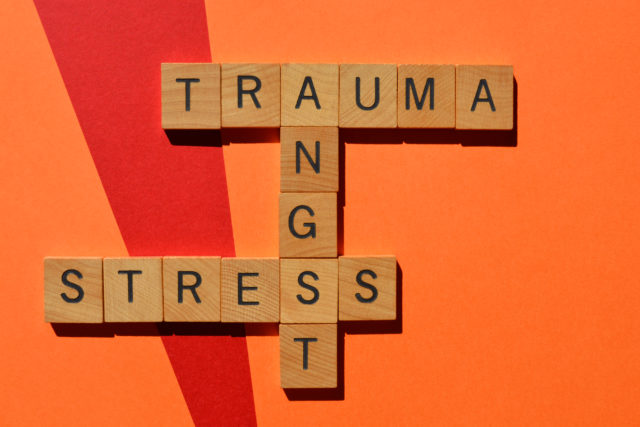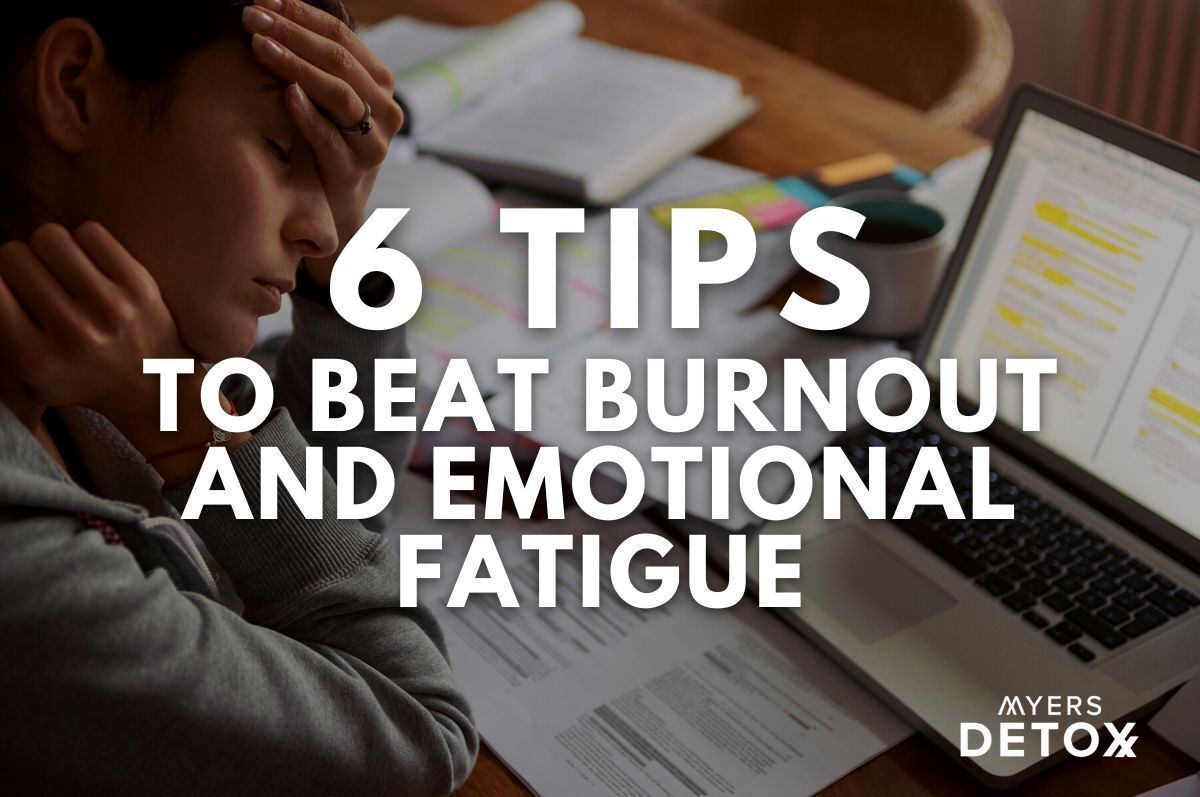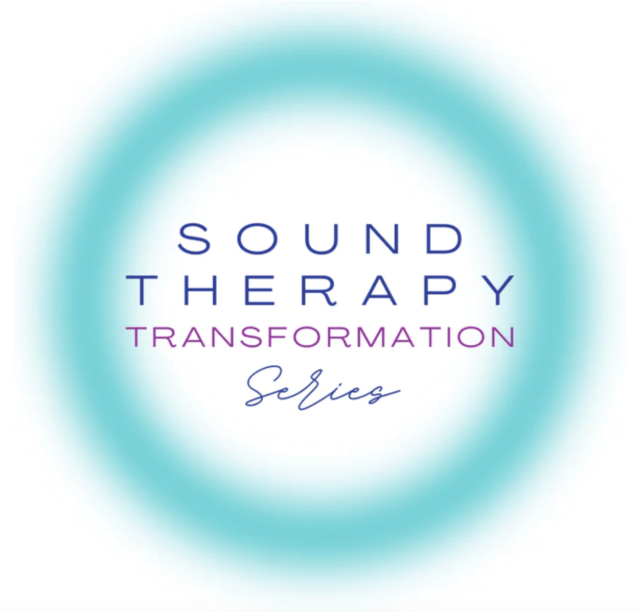Burnout is a term that’s been used colloquially for years; you may tell a friend that you’re “just so burnt out with work,” or the stressors in your life are “burning you out.”
In fact, “burnout” has recently been deemed a medical condition by the World Health Organization[1].
Along with feeling like you’re at your wit’s end, burnout is often accompanied by emotional fatigue, making even the smallest inconvenience feel like an impossible feat.
So, what can you do to turn the tide?
In this article, we’ll explore:
- Why you are so stressed (beyond the obvious reasons)
- The role that heart rate variability plays in your stress response
- How food can either feed or mitigate your stress
- Five simple yet effective tools for combating burnout and emotional stress
Why Are We All So Stressed Out?
Americans are still just as stressed as ever, if not more. You would think by now we would have acclimated to all the new “norms,” and yet we’re still burnt out, pushed to our maximum, fatigued, and just generally drained.
So, what gives?
When looking at stress, it’s important to take a larger view of what’s happening in your body and in your life. One of the primary reasons stress tends to take a long-term hold is its impact on the quality of your life and factors such as diet and sleep[2].
One of the most common coping strategies for managing stress is emotional eating. Biologically, this actually makes a lot of sense. When you were an infant, and you needed love and care, your parents would feed you. This created neurological programming that being fed is a way of signaling to your body that you are safe. Furthermore, the foods that people tend to eat are typically high in fat and sugar, which can elicit feel-good chemicals like dopamine[3].
Grabbing some cookies may seem like a fairly harmless way to soothe stress, and in moderation, it is, but when you chronically give your body low-quality foods, it can actually make matters much worse by increasing stress and anxiety[4].
Another factor that prolongs your stress response is sleep quality. Not surprisingly, when you’re under stress, it can be harder to get a good night of sleep. Unfortunately, poor sleep only feeds the symptoms of stress and can make life feel even more overwhelming[5].
We’re also in front of screens more and more. Research shows that increased screen time is associated with depression and anxiety and overall increased emotional stress[6][7]. Furthermore, screen time (especially in the evening) is associated with reduced sleep quality, further contributing to the stress cascade[8].
And as if all of that wasn’t enough, we now have higher levels of EMF (electromagnetic fields) in our environment than ever before due to the rollout of 5G. Research shows that EMF can impact your nervous system and may further drive your fight or flight response – creating unnecessary stress in your mind and body[9][10].
With all of these factors combined, it’s no wonder that people today are burnt out and emotionally fatigued.
Signs of Burnout
Burnout isn’t something that comes on acutely. Rather, signs of burnout tend to accumulate slowly over time. For this reason, you may not even be aware of how off-balance you are until you’re in the throws of complete overwhelm.
Some signs to watch out for include:
- Feeling fatigued, like you don’t have energy for things that you once found enjoyable
- Brain fog and an inability to concentrate
- Engaging in numbing behaviors in an attempt to dissociate
- Feeling hopeless and helpless, giving up
- Feel depressed, anxious, or in a constant state of worry
If you begin to notice any of the above, it’s a good signal that you may be heading for burnout. Instead of allowing things to get out of control, start including some of the tips below.
Top 6 Ways To Combat Burnout And Emotional Fatigue
#1 Enhance Your Heart Rate Variability
![]()
Heart rate variability (HRV) is quickly becoming one of the most trusted markers for measuring someone’s stress response. Luckily, research shows that HRV isn’t just a marker for stress, but it’s a tool we can train to enhance our resilience to stress.
Put simply; your HRV is a measure of the variation of time between your heartbeats. When there is high variability, you are more resilient to stress. When variability is low, your resilience to stress is weakened.
Low HRV results from an overactive stress response, along with other factors such as lack of sleep, poor diet, and EMF exposure[11][12][13].
One powerful technique that can help enhance HRV is diaphragmatic breathing[14][15]. Diaphragmatic breathing involves breathing deeply into your diaphragm (not your chest), and allowing yourself to slowly exhale through your mouth. Research shows that just 10 to 15 minutes of diaphragmatic breathing each day can result in significant shifts in HRV.
Another excellent tool for enhancing HRV is the Harmoni Pendant. The Harmoni Pendant works by helping your body mitigate the impact of EMF in your environment while simultaneously promoting emotional wellbeing. The reason I love the Harmoni Pendant (and really don’t leave home without it) is because it acts as a fail-safe against the unpredictability of my day. Even when I start the day with diaphragmatic breathing, I never know what kind of stressors will meet me when I leave the sanctuary of my home. When I’m wearing my Harmoni Pendant, I get to take the peace I cultivated in my morning routine with me all day.
#2 Nutrients To Support Resilience and Detox

As mentioned, the food you eat plays a crucial role in your stress response. Consuming foods that are high in sugar, processed grains, and unhealthy fats will push your body towards an unhealthy stress response.
On the other hand, when your diet is rich in vibrant, healthy foods, it will nourish your cells and tissues and allow your nervous system to respond to stress in a balanced way by increasing your HRV[12].
Another important dietary factor that may play a role in your stress response is the presence of heavy metals. It’s unfortunate that much of our food supply today is riddled with heavy metals like cadmium, lead, mercury, and more.
Some research suggests that heavy metal toxicity may have psychiatric implications, which makes it all the more vital that you provide your body with the nutrients it needs to assist in the removal of these metals from your body[16].
Luckily, many of the same foods that feed your cells the nutrients they need to increase your resilience to stress will also help you mitigate the heavy metal load in your environment.
Some of the best foods and herbs that support your body on a cellular level include:
- Medicinal mushrooms
- Broccoli sprouts
- Antioxidant sources like acai, moringa, and pomegranate
- Seaweed and algae
- Greens like alfalfa grass, barley grass, and celery
- Burdock root, milk thistle, and dandelion root
That’s why I included all of these nutrients and more in the Daily Detox formula. This potent powder is tailor-made to enhance cellular health while mitigating the impact of heavy metals on your body. While consuming a high-quality whole foods diet is vital for health and wellbeing, it’s hard to get all of the nutrients you need to keep your body happy and healthy each day.
With Daily Detox, you give yourself a powerful dose of nutrition each day to ensure that your body is getting what it needs. When you add this to a healthy, well-rounded diet, your body’s resilience to stress will multiply.
#3 Use Mindfulness

Mindfulness is a practice that’s becoming more popular as many people are searching for ways to enhance their resilience to stress without turning to medications. Research shows that simple mindfulness practices can have a powerful impact on your stress response by changing the way you perceive stress[17].
There isn’t much you can do about the stressors in your life that lead to burnout. While you can make thoughtful decisions to simplify your life or move away from draining situations, there will always be unforeseen obstacles that present.
That’s why removing stress from your life is not only a challenging feat; it’s an impractical idea that will only lead to more stress and frustration.
As you develop a mindfulness practice, you turn your attention away from avoiding stress to learning how to perceive stress differently. It may not seem like it when you’re in the throes of overwhelm, but the way you interface with stress is actually entirely up to you. Mindfulness practices allow you to create some distance from your emotional reaction to stress and promote your capacity to respond thoughtfully while maintaining a center of inner groundedness.
The most well-known mindfulness practice is mindfulness meditation (of which there are many techniques), but you can also engage in mindfulness through:
- Mindful eating
- Bringing your awareness to the present moment throughout the day
- Mindful walking or exercise like yoga
- Observing your thoughts and feelings without becoming attached to them
- Mindfully doing chores
- And more
#4 Get Enough Sleep

As mentioned previously, low-quality sleep can keep your stress wheels turning and keep you in a prolonged state of unease. When you’re physically and mentally tired, it’s challenging to think outside the box and get out of your head. This often results in more rumination and worry and less productive ways of thinking[5].
Of course, restless sleep and stress can result in a never-ending loop as stress promotes restless sleep, and restless sleep promotes more stress.
To get to the root of your stress and sleep issues, a calming bedtime routine can make a world of difference. Some tips that can help you get more restful sleep include:
- No screens (TV, computer, phone, tablets, etc.) at least one hour before bed – two hours is better.
- Wear blue-light-blocking glasses at night, and turn the lights down low.
- Read fiction before bed to get your imaginative brain working and to help quiet down your analytical brain that wants you to ruminate.
- Steer clear of alcohol as it will disturb your natural sleep rhythm.
- Don’t eat too close to bed (try to avoid food two hours before you go to bed).
- Go to bed before 11 PM, your body wants you to wind down during this time, and if you stay up beyond 11 PM, your hormones may start to ramp back up.
- Don’t drink caffeine in the afternoon if you are sensitive.
- If you have a lot on your mind, try journaling it out to get your thoughts out of your mind and onto paper.
If all of these tips feel overwhelming, try incorporating one or two at a time to see what works best. Ultimately, the more you can remind your body that nighttime is a time for rest and relaxation, the more you’ll train your mind to shut down. Be gentle with yourself; it can take time to retrain your sleep cycle.
#5 Move Your Body

Exercise is one of the best ways to shift your state of mind and give yourself a quick turnaround when you’re feeling overwhelmed. Research shows that any type of movement can help to mitigate stress, so just getting moving is really all you need to worry about[18].
With that being said, if you’re in full burnout mode, you may do better with more gentle forms of exercise such as walking and yoga.
Interestingly, exercise may also enhance your sense of self-confidence and self-esteem. When you’re feeling burnt out, you likely don’t feel that inner strength that comes with strong confidence. Therefore, engaging in exercise can also help you tap into that part of yourself that knows it can handle whatever comes your way – which will pay dividends as you move through life[19].
Furthermore, research shows that exercise can increase levels of brain-derived neurotrophic factor, which is a protein that enhances your brain’s neuroplasticity. Neuroplasticity is a term that describes your brain’s ability to change and reorganize. If you’ve been stuck in limiting and stressful patterns of thinking, BDNF can enhance your ability to shift your focus to more positive and productive ways of thinking[20].
#6 Heal Your Trauma and Unprocessed Emotions

Although this may sound like it’s easier said than done, healing your trauma is crucial for dealing with stress, and getting beyond emotional fatigue.
Trauma, whether it’s coming from deep childhood wounds, stuck emotions you’ve never been able to process, or generational trauma that’s been passed down, is like a parasite to your mind and body.
Unlike your typical everyday stressors, trapped emotions can insidiously change the way you think and act, without you even being aware of it.
How do you know if you have trauma or unprocessed emotions? Well, if you’re like most people you have both of these to some degrees, but some tell-tale signs include:
- You find yourself stuck in the same patterns in areas like relationships, work, and self-worth.
- You have recurring bouts of low mood or nervousness, sometimes for reasons you can’t even pin down.
- You have exaggerated emotional reactions that you may be aware of, but can’t seem to control.
- You feel stuck in your life, even though you have a desire to move forward it feels like there is some unseen force holding you back.
Healing trauma and unprocessed emotions is not always a simple process, and it can take time to get through to the other side. With that being said, there are several modalities that can assist this process and many people are finding their way through the muck by utilizing tools such as sound healing, vagus nerve stimulation, meditation, mindset practices, and more.
As a first step, I recommend checking out these 7 transformative sound healing sessions.
Through this Sound Therapy Transformation Series, you can:
- Release negative emotions and attract what you desire with 7 healing sound therapy sessions containing scientifically researched sounds, frequencies, and vibrational patterns
- Tap into your body’s own energy field and remove the blocks getting in the way of your relationships, creativity, and flow
- Rebalance your nervous system, increase energy, boost cellular regeneration, and promote youthful aging
- Overcome negative experiences and become a vibrational match to an abundant, joy-filled life
Pro tip! To maximize your emotional healing and stress reduction, I highly recommend using these sound healing sessions in conjunction with mindfulness meditation.
Takeaway
If you’re feeling burnt out, emotionally drained, and generally overwhelmed – you’re not alone.
The first thing to remember is that you’re not feeling stressed because there is something wrong with you or your life. As a society (and a world, really), we have been in a stress incubator with seemingly no way out.
The good news is that you can turn around your burnout and overwhelm and enhance your resilience with some simple techniques. If you’re short on time (or energy) grab a Harmoni Pendant and some Daily Detox to get yourself started. These tools offer effortless ways to begin your journey back to resilience.
Once you have your motivation back, start working on overall diet, sleep, and stress reduction strategies like mindfulness, exercise, and deep breathing. You’ll soon find that each of these positive inputs adds up, and your burnout will be a thing of the past – regardless of what’s happening in your life.
*The product mentioned in this article is not intended to diagnose, treat, cure, or prevent any disease. The information in this article is not intended to replace any recommendations or relationship with your physician.










